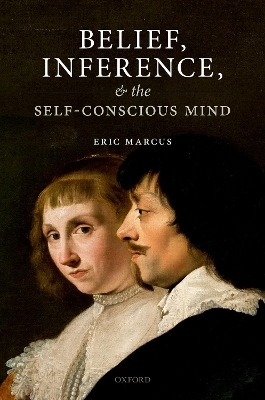
Belief, Inference, and the Self-Conscious Mind
Seiten
2021
Oxford University Press (Verlag)
978-0-19-284563-4 (ISBN)
Oxford University Press (Verlag)
978-0-19-284563-4 (ISBN)
It is impossible to hold contradictory beliefs in mind together at once. Eric Marcus examines the nature of belief and inference, in light of the phenomenon of rational necessity, to reveal how the unity of the rational mind is a function of our knowledge of ourselves as bound to believe the true.
It is impossible to hold patently contradictory beliefs in mind together at once. Why? Because we know that it is impossible for both to be true. This impossibility is a species of rational necessity, a phenomenon that uniquely characterizes the relation between one person's beliefs. Here, Eric Marcus argues that the unity of the rational mind--what makes it one mind--is what explains why, given what we already believe, we can't believe certain things and must believe certain others in this special sense. What explains this is that beliefs, and the inferences by which we acquire them, are constituted by a particular kind of endorsement of those very states and acts. This, in turn, entails that belief and inference are essentially self-conscious: to hold a belief or to make an inference is at the same time to know that one does. An examination of the nature of belief and inference, in light of the phenomenon of rational necessity, reveals how the unity of the rational mind is a function of our knowledge of ourselves as bound to believe the true. Rational self-consciousness is the form of mental togetherness.
It is impossible to hold patently contradictory beliefs in mind together at once. Why? Because we know that it is impossible for both to be true. This impossibility is a species of rational necessity, a phenomenon that uniquely characterizes the relation between one person's beliefs. Here, Eric Marcus argues that the unity of the rational mind--what makes it one mind--is what explains why, given what we already believe, we can't believe certain things and must believe certain others in this special sense. What explains this is that beliefs, and the inferences by which we acquire them, are constituted by a particular kind of endorsement of those very states and acts. This, in turn, entails that belief and inference are essentially self-conscious: to hold a belief or to make an inference is at the same time to know that one does. An examination of the nature of belief and inference, in light of the phenomenon of rational necessity, reveals how the unity of the rational mind is a function of our knowledge of ourselves as bound to believe the true. Rational self-consciousness is the form of mental togetherness.
Eric Marcus is Professor of Philosophy at Auburn University. He works chiefly in the philosophy of mind and action, but has also published widely in epistemology, metaphysics, aesthetics, and the philosophy of language. He is the author of Rational Causation (Harvard University Press).
Introduction
1: Belief and Judgment
2: The Self-Consciousness of Belief
3: Making Nonsense of Moore's Paradox
4: The Challenge for an Account of Inference
5: Inference Without Regress
6: The Unity of the Rational Mind
Conclusion: Philosophical Judgment
| Erscheinungsdatum | 27.10.2021 |
|---|---|
| Verlagsort | Oxford |
| Sprache | englisch |
| Maße | 165 x 241 mm |
| Gewicht | 422 g |
| Themenwelt | Geisteswissenschaften ► Philosophie ► Erkenntnistheorie / Wissenschaftstheorie |
| ISBN-10 | 0-19-284563-2 / 0192845632 |
| ISBN-13 | 978-0-19-284563-4 / 9780192845634 |
| Zustand | Neuware |
| Haben Sie eine Frage zum Produkt? |
Mehr entdecken
aus dem Bereich
aus dem Bereich
die Grundlegung der modernen Philosophie
Buch | Softcover (2023)
C.H.Beck (Verlag)
CHF 25,20
Buch | Softcover (2023)
Reclam, Philipp (Verlag)
CHF 9,80


![Was heißt Denken?. Vorlesung Wintersemester 1951/52. [Was bedeutet das alles?] - Martin Heidegger](/media/113619842)